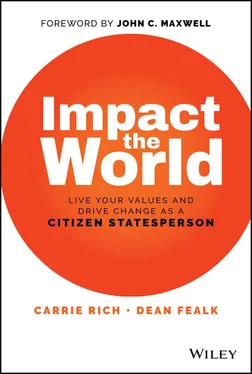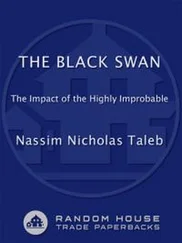Of course, being a citizen statesperson doesn't only mean investing your time. It also means understanding the value of financial investments in your professional development. That shouldn't involve harming your financial security or putting yourself in dire straits, but it may require making reasonable, consistent investments in your own training and opportunities to grow as a citizen statesperson. Over time, for example, if you are able to put aside $100 per month, you can save $1,200 every year—meaning that every other year, you can go to a major conference that makes a dramatic difference in who you are able to meet and the platforms you can experience. Think of it as a venture capital (VC) fund for your personal development.
Like any VC fund, your investment of time and money can spur others to invest as well. True story: at age 22, Carrie wondered aloud to her mentor, Larry Warren, who was then the CEO of Howard University Hospital, why more health systems didn't engage young people to serve on their boards. Three years later, Carrie participated in a women's governance training program to help women prepare for board placement. The program was expensive, so Carrie put as much of her own money toward the program as she could before asking for help by fundraising the rest of the fees. By showing that she was eager to dedicate her time and money for the training, others (shout out to C.E. Andrews) became willing to invest in her too. The lesson was that she shouldn't expect anyone to invest in her if she didn't invest in herself first.
But it wasn't just her financial investment that paid dividends. Carrie also spent a great deal of time emailing and arranging conversations with many people she aspired to learn from. Quite a few responded to her emails and were willing to answer her questions, which helped Carrie prepare for life as a citizen statesperson by uncovering important insights early. Twelve years later, one of the people Carrie asked her questions to—her old mentor, Larry Warren—reached out to ask if Carrie would be interested in serving on a health system board.
Carrie hadn't just idly wondered about the viability of youth participation on health system boards; she had spent years working on the issue, positioning herself to be a sought‐out resource in helping to diversify boards and routinely introducing board candidates through The Global Good Fund network—the organization Carrie leads. That investment of time and energy paid off—and presented her with an opportunity to serve on the Trinity Health board, a $20 billion organization where Carrie serves today.
That story points to another important lesson: it’s important to make known what you want to learn and achieve. Your networks will crystalize opportunities once they know your interests. In fact, that's how this book came to be in the first place: being vocal about our interests is what led us to learn about the Eisenhower fellowship, how we discovered a remarkable opportunity to participate—and how we met each other and began writing this book together three years later.
Time is a finite resource, so there will always be trade‐offs and costs to taking action. If you feel a sense of conviction and you're excited about the opportunity, don't let naysayers or obstacles stop you from achieving your goals.
A Unique Value Proposition
Let's take a moment to understand what sets citizen statespeople apart from other individuals interested in change. We don't see ourselves as protesters. We're not angry fanatics. Citizen statespeople stand in contrast to more strident voices and forces like populism and radicalism because we don't just want to protest an unjust or unacceptable status quo; we want to find and achieve an effective solution. That's not to say that protesters can't become citizen statespeople. Sometimes warriors become diplomats, and nonviolent protest movements play an important role in raising society's awareness of important issues, priming the larger community for change. But to find a solution—when society is ready to change—it's time for a citizen statesperson to step into the breach.
Being a citizen statesperson means you are willing to engage outside of your own bubble by going to communities where you are uncomfortable, by meeting people where they are, and by engaging with views that might run completely counter to your own perspectives. In that sense, being a citizen statesperson is perhaps an antidote to the echo‐chambers and self‐segregation that we see in our public and private lives. Effective politicians often need to work across the aisle to move legislation over the finish line. In public leadership and social entrepreneurship alike, the way to drive impact is by bringing together stakeholders that are, to some degree, at odds with one another. Being a citizen statesperson, like all good diplomacy, is about understanding other peoples' perspectives, needs, and the pressures they face. This bridge‐building capability is what gives a citizen statesperson the power to make a greater impact than a typical protester, activist, or government representative. It's the ability to bring people together around a set of common values and shared objectives.
You may think to yourself: What if I don't have that kind of insight? What if I don't have that kind of empathy? What if I don't always see the broader implications of policies and ideas, and how they affect others?
Here's the thing: few people are actually born with all these skills, and an instinct for empathy alone doesn't translate into effective citizen statespersonship. Instead, these are muscles one can develop and exercise, and attributes one can hone over time. By attuning oneself to a variety of roles and ways of thinking, one can learn to see the connections between people, proposals, and policy implications, develop the empathy needed to engage effectively, and learn the context that provides a useful background for effective solutions.
In other words, become a generalist.
It's rare for any major issue to be purely economic, purely legal, purely environmental, or purely social. Sometimes you want to hear what an entrepreneur has to say about a problem, because fast change and business engagement is key. Sometimes you'll want to connect with a policymaker, because the scope or scale of the problem is too broad for one sector to solve on its own. Sometimes you'll want to use a nonprofit approach because it's less tethered to certain societal pressures or bureaucratic constraints.
A citizen statesperson is the person who pulls together the threads, people, and resources to solve pressing challenges.
Anne Rweyora is an example of someone who has done exactly that. Anne grew up in Uganda, where nearly 70 percent of people live in substandard housing. That lack of quality housing compromises people's ability to achieve financial stability, provide for their children, and build community. After Anne's father passed away, she was homeless for 20 years—her experience drove her to find ways to support people in need.
As co‐founder and CEO of Smart Havens Africa since 2018, Anne is directing her expertise into a mission to end housing poverty for vulnerable Ugandan communities. Her organization helps women and families acquire homes affordably through a rent‐to‐own model, moving homeowners towards legal ownership of the land where their house is built without the risk of being evicted.
Part of what makes Anne's operation so impressive is that she's addressing multiple objectives through one model. Smart Havens Africa's homes are environmentally friendly, using locally made interlocking blocks that don't need firing to meet climate goals set by the United Nations. At the same time, the homes are outfitted to use renewable energy and incorporate green innovations like rainwater harvesting systems and biodigestors that can turn waste into fertilizer.
Читать дальше












